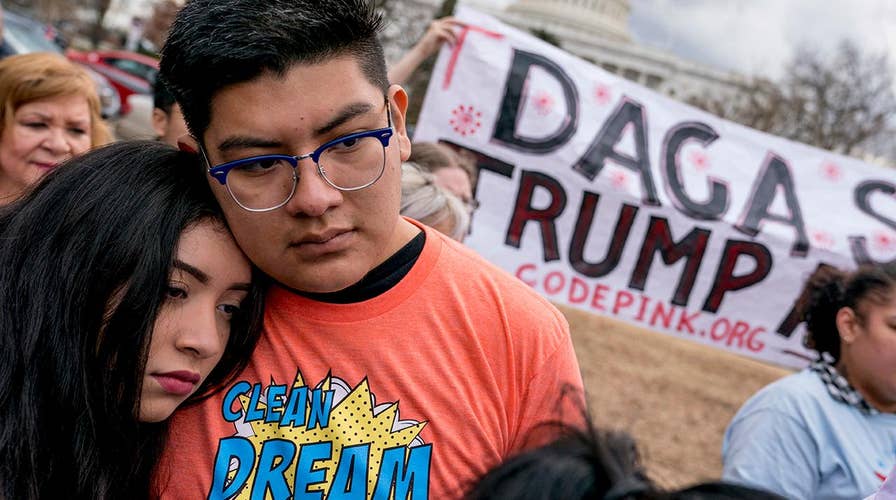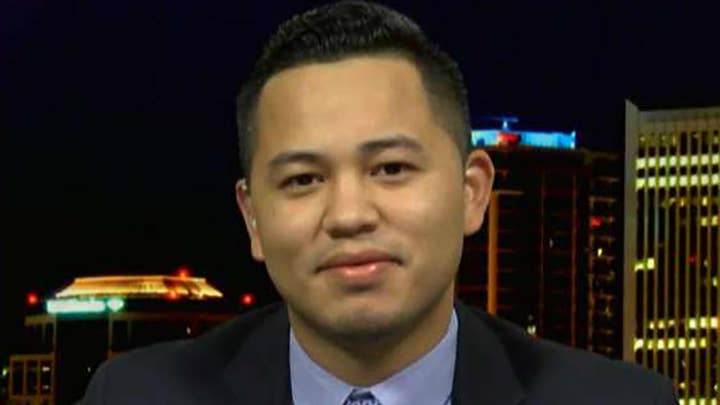Supreme Court inaction suggests DACA recipients are safe for another year
DACA recipient Hilario Yanez weighs in on Congress’ inability to get immigration reform passed.
The announcement Tuesday that the Supreme Court will not review, for now, the issue of whether President Trump can end the Deferred Action for Childhood Arrivals (DACA) program is a strong indication that justices will not consider the issue before their new term begins in October.
This makes for a gut-wrenching good news-bad news moment for 700,000 young people contributing to our economy.
On one hand, DACA’s protections remain in place and renewals can proceed. That means the 700,000 young people brought to the U.S. in violation of immigration laws when they were children – some as young as babies – can remain here temporarily.
So existing DACA recipients – some of the larger group of young immigrants known as Dreamers – still can work and go to college legally, protected from deportation. On the other hand, the DACA program remains temporary. Legal challenges continue to wind through the courts, and the uncertainty is likely to continue at least through later this year, if not into 2020.
As long as Congress and President Trump cede their legal powers to the courts, the 700,000 DACA recipients and hundreds of thousands of additional young people who cannot currently apply to enter the program will continue to be political pawns.
These young people want nothing more than to contribute to America. They want the giant question mark hanging over their futures to be removed, so they can remain in the country they love – the only country many of them remember living in.
Take, for example, Cintya Garcia, a junior at the University of California-Irvine who is facing a change to her career path because of DACA’s uncertain future.
Garcia was brought to the U.S. when she was only a year old. She has always wanted to become a teacher and is pursuing an education major thanks to DACA. She counts her blessings as a DACA recipient.
But DACA’s uncertainty makes Garcia unsure she will be able to secure a teaching job after college, not to mention stay in the country. For her, America is home and she wants to teach America’s children. Having lived in the shadows before DACA, the thought of returning to them takes an emotional toll.
In all, about 9,000 DACA recipients across the U.S. are working as teachers or in related professions. Imagine telling your child his or her favorite teacher has been deported. Imagine schools scrambling to find replacements for these teachers if they are thrown out of the country where they came of age.
Then look at Bernardo Castro, brought to Utah when he was only 4. Castro, who now lives in Spanish Fork, Utah, graduated in December with a business management degree from Brigham Young University and has a job lined up with Pepsi-Cola.
“It’s been really just an emotional roller coaster,” he says. “You know, you never really know what to expect …. It’s very hard to plan your life when things are uncertain like this.” He took the job, he says, “but who knows how much of a career I can have with them?”
Lower court rulings offer Cintya Garcia and Bernardo Castro only temporary reassurance – no certainty.
Put yourself in their shoes. How do you plan your life when your livelihood is so uncertain? What investments in yourself, your community and your country would you put on hold because your ability to contribute could end with a court ruling?
How do you start college if you don’t know if you will be in the U.S. long enough to graduate?
How do you use your life savings to start a small business if you fear you won’t be around to run it? How many employees would lose their jobs when your business collapses?
Most DACA recipients are from Latin American countries. But because they grew up in the U.S., many speak little or no Spanish and have little or no ability to read and write Spanish. If you aren’t a Spanish speaker, how would you make a living if you were suddenly returned to a Spanish-speaking country you might not know at all?
How can you marry and have children if you don’t know if you will be separated from your loved ones? If you are married already and a parent, how would you say goodbye to your wife or husband and your children, depriving them of your income, your care and your love?
Is this what America is about? Turning the American Dream into the American Nightmare for young people brought here when they were children, through no fault of their own?
Is this what America is about? Turning the American Dream into the American Nightmare for young people brought here when they were children, through no fault of their own?
Of course, the Supreme Court’s pass on ruling on DACA also lands amid government paralysis that has 800,000 federal workers going without a paycheck and struggling to pay their bills. As Congress and President Trump govern by crisis, a constructive approach is nearly impossible to come by.
President Trump’s opening offer made Saturday to end the stalemate by allowing DACA recipients to stay in the U.S. for three more years looks weaker now, in light of the Supreme Court not taking up the question of whether the president can end DACA.
In fact, the president’s proposed protections for DACA recipients are actually worse than the status quo that court rulings have provided, thanks to stricter provisions from the White House. And the president’s advisers have inserted a menu of poison pills designed to scuttle any chance of bipartisan success.
Perhaps the partial government shutdown provides an opening. Americans are tired of polarization, which points to resolving our immigration challenges in a bipartisan way. Strong majorities support finding a way for young people brought here as children to earn full legal status and eventual citizenship. And the shutdown isn’t playing well with the public, polls show.
If Senate Majority Leader Mitch McConnell, R-Ky., is willing to create a process that leads to compromise, a solution that Americans would support – and Democrats would accept – is possible. And as a politically shrewd dealmaker, President Trump could claim victory on multiple fronts if he were to recognize the opportunity such a solution would offer him.
DACA is hanging on because of court rulings that, though extended, are still temporary. Republicans and Democrats in Washington should get serious about a compromise that includes strong border security and a permanent answer for these young people, whose promise and possibility we have now witnessed for years.
The fate of young contributors brought here as children needs to be resolved with solutions from Congress and the president, not in the courts.
The opportunity before McConnell, President Trump and other Republicans in Washington – to offer certainty – is clear. They should take it.


